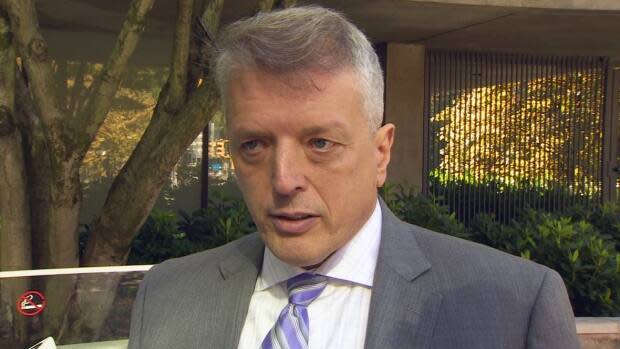Fellow VPD officers may have helped detective obstruct misconduct investigation, lawyer alleges
Officers in a specialized unit of the Vancouver Police Department may have helped former detective James Fisher obstruct the investigation into his own sexual misconduct, a B.C. court heard Friday morning.
Lawyer Tom Arbogast made that claim after Vancouver police confirmed three other officers in the VPD's Counter Exploitation Unit are facing an outside criminal probe in connection with their conduct during the Fisher investigation.
"It's clear to us, from what we have been given on Fisher, that Fisher obstructed the investigation into himself," Arbogast told a panel of three justices in the B.C. Court of Appeal.
"We believe that the investigation into the other officers was because they were helping Fisher to obstruct the investigation into himself…. We have a clear basis to allege that."
Fisher was once a celebrated officer with the Counter Exploitation Unit, which has led major investigations into prostitution and human trafficking operations. He was sentenced last year to 20 months in jail for sexual exploitation and breach of trust for kissing two female victims of sex crimes.

The serious crimes division of the Alberta RCMP is leading the investigation into the other CEU officers, which began in 2017. The officers remain on active duty, but have been transferred to another unit.
During Friday's hearing, Arbogast also alleged that CEU officers conducted the investigation into Fisher's misconduct, but that claim was denied by a VPD spokesperson, who said the probe was led by the Major Crimes Section.
An 'extraordinary obsession'
Recent months have seen a steady stream of new allegations against Fisher, including suggestions that his misconduct was much more serious and extensive than previously known. There have been allegations that Fisher sexually abused several other young women during the course of his investigations into Vancouver pimps, beginning mere months after he joined the Counter Exploitation Unit in 2011.
Arbogast represents Reza Moazami, who was convicted of dozens of charges for running an underage prostitution ring after a historic and widely publicized investigation led by Fisher.

Moazami is now appealing his convictions, alleging that Fisher had sexual contact with at least six victims and a key witness before, during and after Moazami's trial, and that he encouraged witnesses to lie in court.
"There is a very real concern that there has not been any effort to get to the bottom of Mr. Fisher's serious misconduct and its effect on Mr. Moazami's trial," Arbogast said Friday.
He alleged that Fisher had an "extraordinary obsession" with the Moazami investigation, and that he "went to untold lengths to get convictions in this case because it was a feather in his cap."
Sex, money and drugs
Arbogast detailed a long list of allegations against Fisher, most of which have yet to be tested in court. They include claims that Fisher:
Offered and procured drugs for multiple victims in Moazami's trial;
Gave them "significant amounts of money";
Stayed in hotel rooms with them;
Coerced them into sex;
Bought them food, cigarettes and other items in exchange for sexual favours;
Helped one witness avoid an attempted murder charge;
Provided others with police intelligence on people;
Arranged protection for the young women while they worked in the sex trade;
Deleted his own text messages and Facebook account to obstruct investigators;
The latest court appearance saw Arbogast apply for an order to appoint a special commissioner to review the mounds of evidence that came out of the Fisher investigation and decide how much should be disclosed to Moazami's legal team.
To date, Crown has disclosed about 3,500 pages of investigatory material, but those pages have been heavily redacted, Arbogast said. He told the court there may be as many as 24,000 pages available.
Crown prosecutors told the panel of justices that the other material is not relevant to Moazami's case. The judges reserved their decision on the application until a later date.

